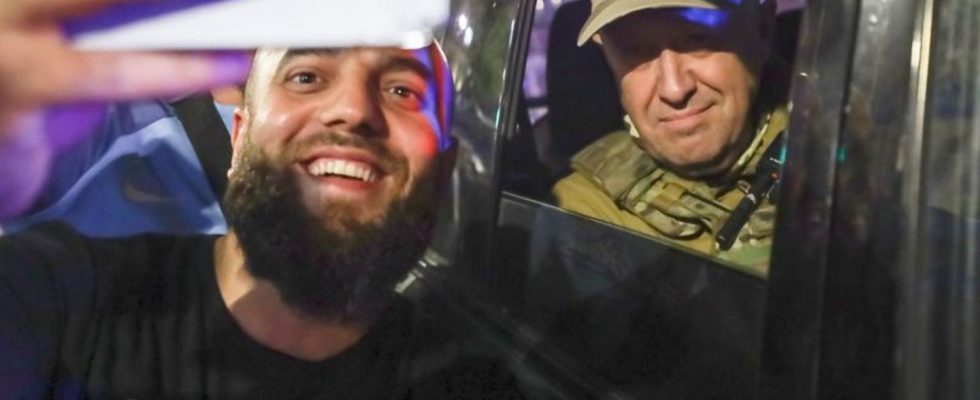Military
After the uprising – Putin’s weakness becomes apparent
Yevgeny Prigozhin (r), owner of the military company Wagner Group, sits in a military vehicle and has a selfie taken with a civilian on a street in Rostov-on-Don. photo
© -/AP/dpa
The mercenary armed uprising against the Kremlin has ended almost as quickly as it began. Mastermind Prigozhin should get away with it. But the consequences could be significant.
Rapid end to a revolt: After a forced march by Wagner’s private army on the Russian capital, mercenary chief Yevgeny Prigozhin suddenly ordered a retreat about 200 kilometers from Moscow on Saturday evening. This may have avoided bloodshed between Russia’s armed forces. Despite the “treason” (as Vladimir Putin put it), Prigozhin should get away with it. But will the promise from the Kremlin actually live up to? Many other questions also remain unanswered.
What will become of the Wagner group now?
The private army – about 25,000 men according to Prigozhin’s most recent figures – will probably be disbanded. At its core, the conflict revolved around whether the mercenaries should be subordinate to the Defense Ministry in Moscow or remain as an independent force. This is what Prigozhin wanted. Now some of the Wagner fighters are to be taken over by the regular Russian armed forces and thus continue to be involved in the war of aggression against Ukraine.
According to the Kremlin, Prigozhin and all his people should go unpunished despite the uprising. But many Wagner officers made a conscious decision not to serve in the Defense Ministry, which was paralyzed by rigid chains of command and bureaucracy. There is a high probability that they will no longer take part in the war – especially since the Kremlin cannot be sure of their loyalty.
Is the Russian army weaker without Prigozhin?
Prigozhin has assembled one of the most powerful troops in Russia. The tens of thousands of criminals he recruited in prisons for the war in Ukraine, which has now lasted 16 months, made headlines. But they were only considered “cannon fodder” for the bloody storming of the eastern Ukrainian city of Bakhmut and for other battlefields. In fact, many of the ex-convicts were killed.
In addition, highly professional mercenaries with extensive combat experience are deployed in the private army. Some served in the Russian Armed Forces in various conflicts. Others were involved in earlier Wagner operations – for example in Syria, in Mali or in Russia’s shadow war in Donbass before 2022. Many of these veterans in particular are likely to retire.
In addition, the command structure at Wagner was decentralized. This allowed decisions to be made on the battlefield faster than the bureaucratic way of the regular army. In this respect, Wagner’s disappearance significantly weakens the Russian armed forces in the war.
Why was the reaction so hesitant?
The march on Moscow revealed an enormous security deficit. A large part of the Russian armed forces is tied up in Ukraine. These were now missing in the hinterland to face the unexpected danger. Only the Air Force could have intervened in time anyway. But the Russian army needs this to slow down the Ukrainian counter-offensive. A domestic deployment would have exposed the front dangerously.
Russia’s National Guard proved inept in the unchecked advance of Wagner’s troops. It took the leadership far too long to counter the Wagner group. The mercenaries were unable to stop truck locks and hastily torn roads. According to unconfirmed reports, there were also fatalities: about a dozen pilots are said to have died trying to attack Prigozhin’s column. The Wagner people are said to have shot down several helicopters and an airplane. Ultimately, however, Prigozhin probably had doubts that the march on Moscow could actually be successful.
Does the uprising mean the beginning of the end of the Putin system?
According to most observers, the head of the Kremlin still has immense resources to stay in power – despite numerous defeats in the war against Ukraine. But there is also agreement that the 70-year-old is now significantly weakened after almost a quarter of a century in power. According to political scientist Abbas Galliamov, the most recent attacks on Russian territory by the Ukrainian side have also destroyed the “myth of the invincibility of Putin’s military.” Nothing loses the support of the power apparatus as much as the inability to protect people.
Nevertheless, the system showed no cracks during the Wagner revolt on Saturday. The elite remained loyal to Putin. Nobody publicly sided with Prigozhin, who has no power base of his own in Russia. Putin is still considered set for the presidential election in March 2024. Most Russians still trust him to lead the resource and nuclear power out of the crisis – even under the growing economic pressure from Western sanctions. This could also be due to the lack of alternatives to Putin.
What role did Belarus’ ruler Lukashenko play?
Apparently there was nobody in Russia who could have negotiated with Prigozhin. That’s why Lukashenko offered himself. The “last dictator in Europe,” as many call him, has known the businessman personally for 20 years, according to the Kremlin. He finally made him give up too. What was agreed is not known. In any case, Prigozhin has to get out of Russia – to Belarus. Some experts suspect that, despite all the promises, he will by no means be safe there.

